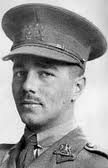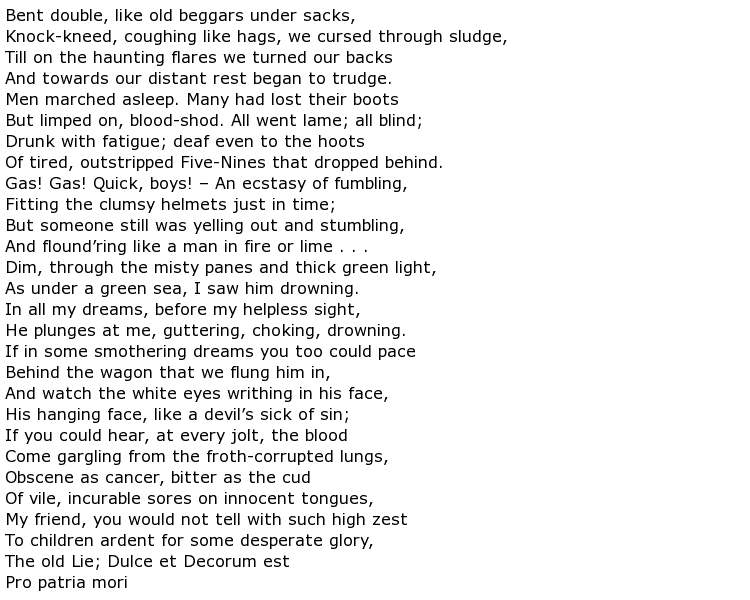 We often think of the poets who were around during that terrible period in world history, the years covering the First World War, as being very few in number. It is true that only a small number became famous but, in fact, over two thousand soldiers spent their time both trying to survive the grim battlefields while writing poignant verse at the same time. Wilfred Owen was such a man but, tragically, his work was only published after his death.
We often think of the poets who were around during that terrible period in world history, the years covering the First World War, as being very few in number. It is true that only a small number became famous but, in fact, over two thousand soldiers spent their time both trying to survive the grim battlefields while writing poignant verse at the same time. Wilfred Owen was such a man but, tragically, his work was only published after his death.
Like many young men of the time he heard of the heroic and glorious deeds carried out by his countrymen, especially in the Western Front trenches, and decided he should do his duty. Whether an educated, artistic individual such as Owen was really suited to such a task is neither here nor there. He had already seen what was going on in France from the safe environment of the Berlitz School of Languages in Bordeaux, France, teaching English and French. It was in October 1915 that the call of duty became too strong to resist and he enlisted in the Artists’ Rifles Officers’ Training Corps.
The horrors of the western front confronted him in January 1917 and he soon fell victim to shellshock and was quickly repatriated to Craiglockhart War Hospital near Edinburgh. He had been writing for some time at this point and what he saw of the war convinced him that this was no glorious conflict but one of sheer terror for those unlucky enough to experience it. His writings were hard-hitting, telling the reader exactly how a soldier lived and died in this most brutal of environments. His most famous poems included ‘Dulce et Decorum Est’ and ‘Anthem for Doomed Youth’.
It was while in Scotland that he met other literary figures, soon to become well known. Siegfried Sassoon was of the same mind as Owen regarding the war and an introduction was soon made to Robert Graves. The conversations and the poetry readings that these men shared boosted Owen’s resolve and encouraged him to return to France in August 1918, despite his feelings about the whole sorry affair. He threw himself into his duties though and only two months into his final tour of duty was awarded the highest of military honours for bravery – the Military Cross.
Tragically, with the war entering its final days, he was killed just one week before Armistice Day. His parents heard of William’s death on the 11th of November, that most significant of days, heightening the tragedy of his loss all the more. A promise made by Sassoon while in Edinburgh was fulfilled as an edited collection of his poignant war poems was published in 1920, thus establishing the name of William Owen among the country’s greatest poets.
The things that he saw in France convinced this educated, gentle man of the cruelty and waste of life that war brings. While the poem ‘Dulce et Decorum Est’ is not an autobiographical account of actual events it certainly reads as if it is. Owen’s horror and outrage is evident throughout and it is such a powerful piece of writing that schools still use the text as a stellar example of WW1 poetry. The Latin in the title and the final line describes the general feeling at that time that it was “sweet and right to die for your country”. More than that – it was an honour. Wilfred Owen clearly did NOT believe that this was so.
The poem is reproduced below – a powerful piece of work indeed. It describes in graphic detail the aftermath for those unfortunates caught in an enemy gas attack in the trenches. It challenges those who have not had to witness such horrors to question ‘the old lie’ that it is a sweet honour to die for your country…….


